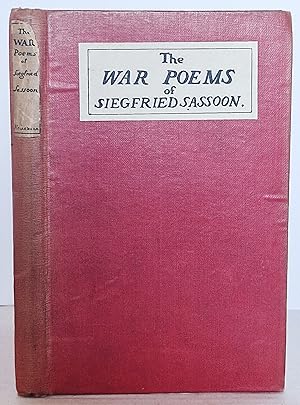A propos de cet article
small 8vo, 95pp, half-title present, orig. red cloth with white paper title labels to spine and upper cover with black lettering design by William Nicholson, label on spine slightly chipped on one corner, spine a little sunned. A VG clean copy. Of these 64 poems, 12 are now published for the first time. (Keynes, A20. One of 2,000 copies). Siegfried Sassoon is best remembered for his angry and compassionate poems about World War I, which brought him public and critical acclaim. Avoiding the sentimentality and jingoism of many war poets, Sassoon wrote of the horror and brutality of trench warfare and contemptuously satirized generals, politicians, and churchmen for their incompetence and blind support of the war. He was also well known as a novelist and political commentator. In 1957 he was awarded the Queen s Medal for Poetry. Born into a wealthy Jewish family, sometimes called the Rothschilds of the East because the family fortune was made in India, Sassoon lived the leisurely life of a cultivated country gentleman before the World War I, pursuing his two major interests, poetry and fox hunting. Following the outbreak of the World War I, Sassoon served with the Royal Welch Fusiliers, seeing action in France in late 1915. He received a Military Cross for bringing back a wounded soldier during heavy fire. After being wounded in action, Sassoon wrote an open letter of protest to the war department, refusing to fight any more. I believe that this War is being deliberately prolonged by those who have the power to end it, he wrote in the letter. At the urging of Bertrand Russell, the letter was read in the House of Commons. Sassoon expected to be court-martialed for his protest, but poet Robert Graves intervened on his behalf, arguing that Sassoon was suffering from shell-shock and needed medical treatment. In 1917, Sassoon was hospitalized. The later collection The War Poems of Siegfried Sassoon included 64 poems of the war, most written while Sassoon was in hospital recovering from his injuries. Public reaction to Sassoon s poetry was fierce. Some readers complained that the poet displayed little patriotism, while others found his shockingly realistic depiction of war to be too extreme. Even pacifist friends complained about the violence and graphic detail in his work. But the British public bought the books because, in his best poems, Sassoon captured the feeling of trench warfare and the weariness of British soldiers for a war that seemed never to end.
N° de réf. du vendeur 2387
Contacter le vendeur
Signaler cet article




